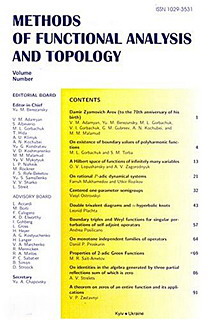Vol. 25 (2019), no. 2
Yuriy Makarovich Berezansky
MFAT 25 (2019), no. 2, 97-97
97-97
On eigenvalues of banded matrices
MFAT 25 (2019), no. 2, 98-103
98-103
In the paper, asymptotics for eigenvalues of Hermitian, compact operators, generated by infinite, banded matrices is obtained in terms of the asymptotics of their matrix entries. Analogues for banded matrices of Gershgorin's disks theory are discussed.
On maximal multiplicity of eigenvalues of finite-dimensional spectral problem on a graph
Olga Boiko, Olga Martynyuk, Vyacheslav Pivovarchik
MFAT 25 (2019), no. 2, 104-117
104-117
Recurrence relations of the second order on the edges of a metric connected graph together with boundary and matching conditions at the vertices generate a spectral problem for a self-adjoint finite-dimensional operator. This spectral problem describes small transverse vibrations of a graph of Stieltjes strings. It is shown that if the graph is cyclically connected and the number of masses on each edge is not less than 3 then the maximal multiplicity of an eigenvalue is $\mu+1$ where $\mu$ is the cyclomatic number of the graph. If the graph is not cyclically connected and each edge of it bears at least one point mass then the maximal multiplicity of an eigenvalue is expressed via $\mu$, the number of edges and the number of interior vertices in the tree obtained by contracting all the cycles of the graph into vertices.
Weak-coupling limit for ergodic environments
Martin Friesen, Yuri Kondratiev
MFAT 25 (2019), no. 2, 118-133
118-133
The main aim of this work is to establish an averaging principle for a wide class of interacting particle systems in the continuum. This principle is an important step in the analysis of Markov evolutions and is usually applied for the associated semigroups related to backward Kolmogorov equations, c.f. [27]. Our approach is based on the study of forward Kolmogorov equations (a.k.a. Fokker-Planck equations). We describe a system evolving as a Markov process on the space of finite configurations, whereas its rates depend on the actual state of another (equilibrium) process on the space of locally finite configurations. We will show that ergodicity of the environment process implies the averaging principle for the solutions of the coupled Fokker-Planck equations.
The Welland inequality on hypergroups
MFAT 25 (2019), no. 2, 134-141
134-141
The Welland inequality for fractional integrals on hypergroups with quasi-metric and Haar measure is proved. This inequality gives pointwise estimates of fractional integrals by fractional maximal operators.
Abstract formulation of the Cole-Hopf transform
MFAT 25 (2019), no. 2, 142-151
142-151
Operator representation of Cole-Hopf transform is obtained based on the logarithmic representation of infinitesimal generators. For this purpose the relativistic formulation of abstract evolution equation is introduced. Even independent of the spatial dimension, the Cole-Hopf transform is generalized to a transform between linear and nonlinear equations defined in Banach spaces. In conclusion a role of transform between the evolution operator and its infinitesimal generator is understood in the context of generating nonlinear semigroup.
On isometries satisfying deformed commutation relations
MFAT 25 (2019), no. 2, 152-160
152-160
We consider an $C^*$-algebra $\mathcal{E}_{1,n}^q$, $q\le 1$, generated by isometries satisfying $q$-deformed commutation relations. For the case $|q|<1$, we prove that $\mathcal E_{1,n}^q \simeq\mathcal E_{1,n}^0=\mathcal O_{n+1}^0$. For $|q|=1$ we show that $\mathcal E_{1,n}^q$ is nuclear and prove that its Fock representation is faithul. In this case we also discuss the representation theory, in particular construct a commutative model for representations.
Köthe-Orlicz vector-valued weakly sequence spaces of difference operators
MFAT 25 (2019), no. 2, 161-176
161-176
In the present article, we propose vector-valued weakly null, weakly convergent and weakly bounded sequences over n-normed spaces associated with infinite matrix, Musielak-Orlicz function and difference operator. We make an effort to study some algebraic and topological properties of these sequence spaces. Further, we shall investigate some inclusion relations between newly formed sequence spaces.
Subscalarity of $k$-quasi-class $A$ operators
MFAT 25 (2019), no. 2, 177-188
177-188
In this paper, we show that every $k$-quasi-class $A$ operator has a scalar extension and give some spectral properties of the scalar extensions of $k$-quasi-class $A$ operators. As a corollary, we get that such an operator with rich spectrum has a nontrivial invariant subspace.
Operators preserving orthogonality on Hilbert $\it{K}(H)$-modules
R. G. Sanati, E. Ansari-piri, M. Kardel
MFAT 25 (2019), no. 2, 189-194
189-194
In this paper, we study the class of orthogonality preserving operators on a Hilbert $\it{K(H)}$-module $W$ and show that an operator $T$ on $W$ is orthogonality preserving if and only if it is orthogonality preserving on a special dense submodule of $W$. Then we apply this fact to show that an orthogonality preserving operator $T$ is normal if and only if $T^*$ is orthogonality preserving.


